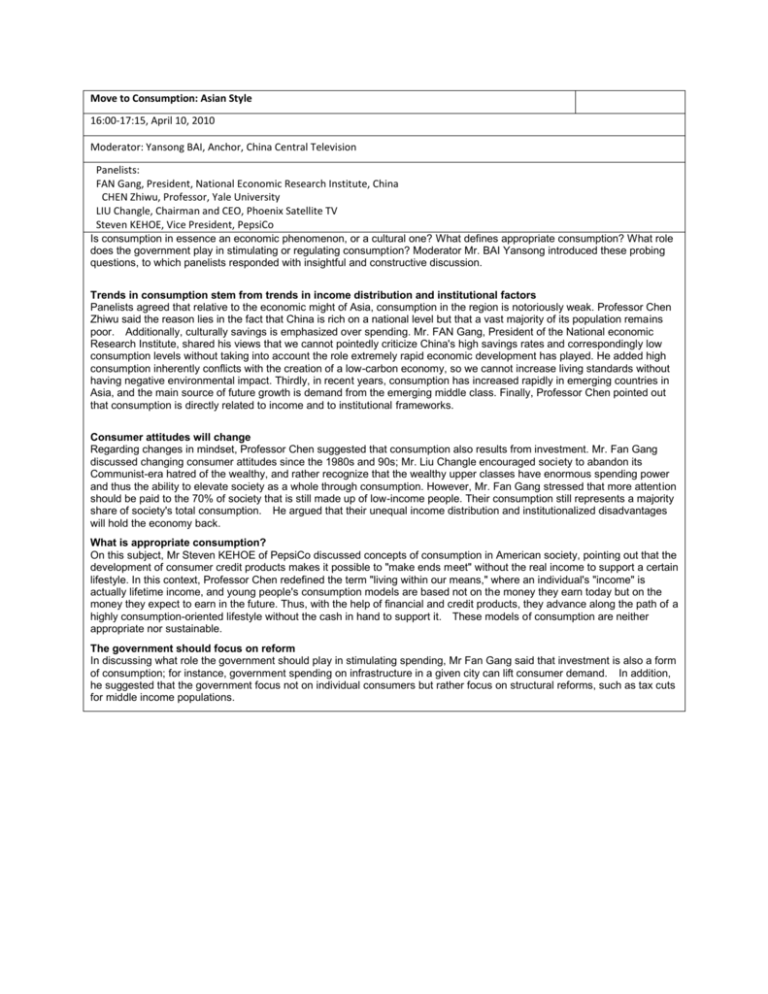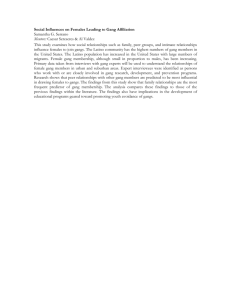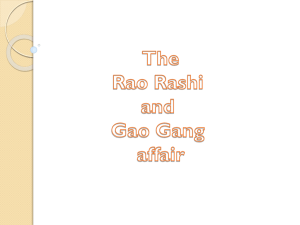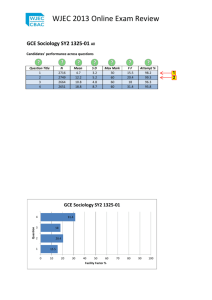Move to Consumption: Asian Style
advertisement

Move to Consumption: Asian Style 16:00-17:15, April 10, 2010 Moderator: Yansong BAI, Anchor, China Central Television Panelists: FAN Gang, President, National Economic Research Institute, China CHEN Zhiwu, Professor, Yale University LIU Changle, Chairman and CEO, Phoenix Satellite TV Steven KEHOE, Vice President, PepsiCo Is consumption in essence an economic phenomenon, or a cultural one? What defines appropriate consumption? What role does the government play in stimulating or regulating consumption? Moderator Mr. BAI Yansong introduced these probing questions, to which panelists responded with insightful and constructive discussion. Trends in consumption stem from trends in income distribution and institutional factors Panelists agreed that relative to the economic might of Asia, consumption in the region is notoriously weak. Professor Chen Zhiwu said the reason lies in the fact that China is rich on a national level but that a vast majority of its population remains poor. Additionally, culturally savings is emphasized over spending. Mr. FAN Gang, President of the National economic Research Institute, shared his views that we cannot pointedly criticize China's high savings rates and correspondingly low consumption levels without taking into account the role extremely rapid economic development has played. He added high consumption inherently conflicts with the creation of a low-carbon economy, so we cannot increase living standards without having negative environmental impact. Thirdly, in recent years, consumption has increased rapidly in emerging countries in Asia, and the main source of future growth is demand from the emerging middle class. Finally, Professor Chen pointed out that consumption is directly related to income and to institutional frameworks. Consumer attitudes will change Regarding changes in mindset, Professor Chen suggested that consumption also results from investment. Mr. Fan Gang discussed changing consumer attitudes since the 1980s and 90s; Mr. Liu Changle encouraged society to abandon its Communist-era hatred of the wealthy, and rather recognize that the wealthy upper classes have enormous spending power and thus the ability to elevate society as a whole through consumption. However, Mr. Fan Gang stressed that more attention should be paid to the 70% of society that is still made up of low-income people. Their consumption still represents a majority share of society's total consumption. He argued that their unequal income distribution and institutionalized disadvantages will hold the economy back. What is appropriate consumption? On this subject, Mr Steven KEHOE of PepsiCo discussed concepts of consumption in American society, pointing out that the development of consumer credit products makes it possible to "make ends meet" without the real income to support a certain lifestyle. In this context, Professor Chen redefined the term "living within our means," where an individual's "income" is actually lifetime income, and young people's consumption models are based not on the money they earn today but on the money they expect to earn in the future. Thus, with the help of financial and credit products, they advance along the path of a highly consumption-oriented lifestyle without the cash in hand to support it. These models of consumption are neither appropriate nor sustainable. The government should focus on reform In discussing what role the government should play in stimulating spending, Mr Fan Gang said that investment is also a form of consumption; for instance, government spending on infrastructure in a given city can lift consumer demand. In addition, he suggested that the government focus not on individual consumers but rather focus on structural reforms, such as tax cuts for middle income populations.





